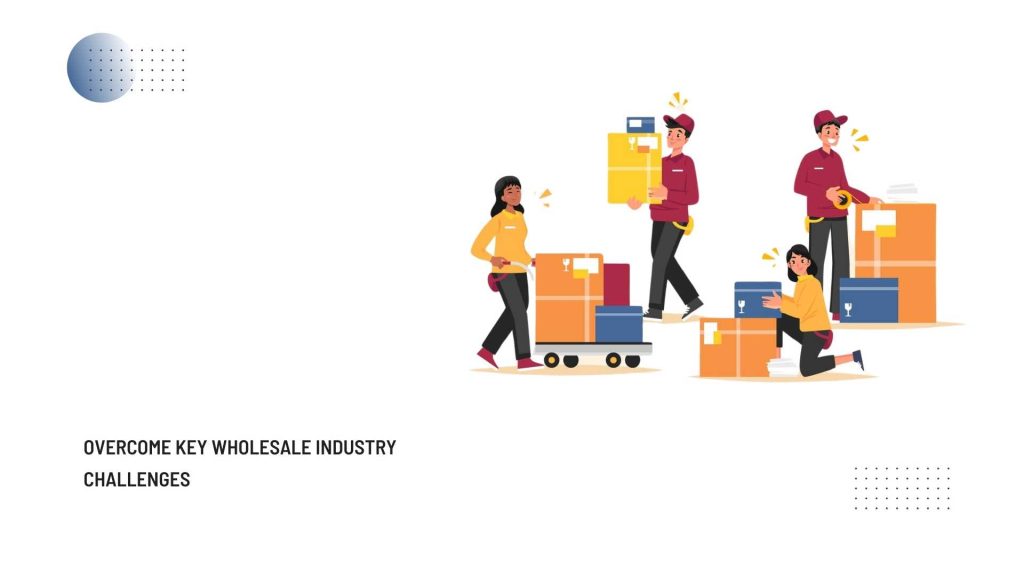In the dynamic realm of wholesale, staying ahead means constantly adapting to emerging trends while tackling persistent challenges head-on. From technological advancements revolutionizing operations to market shifts altering consumer demands, wholesale businesses are navigating a landscape of opportunities and obstacles. Let’s see the latest trends and challenges shaping the wholesale industry today.
List of Best practices in the wholesale industry
- Efficient inventory management
- Streamlined order processing
- Strong supplier relationships
- Accurate demand forecasting
- Effective pricing strategies
- Continuous market research
- Robust logistics and distribution networks
- Regular performance analysis and optimization
- Embracing technology for automation and data analysis
- Exceptional customer service
Wholesale Industry Trends
Embracing Digital Transformation:
The wholesale sector is undergoing a digital revolution, with technology becoming integral to every aspect of operations. From AI-driven inventory management to blockchain-powered supply chains, businesses harness digital tools to enhance efficiency and streamline processes.
Embracing e-commerce platforms and digital marketplaces is no longer an option but a necessity for wholesalers looking to thrive in a competitive landscape.
Demand for Personalization:
As consumers increasingly seek personalized experiences, wholesalers are under pressure to deliver tailored solutions. Customization isn’t just limited to products but extends to pricing models, delivery options, and customer service. Leveraging data analytics and AI, wholesalers can gain insights into consumer preferences, enabling them to offer personalized recommendations and anticipate future demands.
Sustainability and Ethical Sourcing:
With environmental concerns rising and ethical considerations becoming more prominent, sustainability is no longer a buzzword but a business imperative. Wholesalers must prioritize eco-friendly practices and ethical sourcing throughout their supply chains. From reducing carbon footprints to promoting fair labor practices, sustainability initiatives are socially responsible and increasingly preferred by consumers.
Supply Chain Resilience:
Wholesalers are reevaluating their supply chain strategies, diversifying sourcing locations, and investing in contingency plans to mitigate risks posed by future crises. Collaboration with suppliers, implementing real-time tracking systems, and adopting agile logistics solutions are key steps in building resilient supply chains.
key wholesale industry challenges
Margin Pressures:
Wholesalers face significant margin pressures in an environment of fierce competition and price-sensitive consumers. Rising costs, intense competition from online marketplaces, and retailers’ demands for competitive pricing pose challenges to profitability. Balancing the need to remain competitive while maintaining healthy margins requires strategic pricing and cost management strategies.
Inventory Management Complexity:
Managing inventory efficiently remains a perennial challenge for wholesalers, especially in the face of fluctuating demand and supply chain disruptions. Balancing inventory stock to meet consumer demands without overstocking or understocking requires sophisticated inventory management systems and predictive analytics capabilities. Failure to optimize inventory management can result in lost sales, excess carrying costs, and customer dissatisfaction.
Regulatory Compliance:
Wholesalers in industries like food and pharmaceuticals face challenges with regulations and compliance. Meeting standards for product safety and import/export is crucial to prevent legal issues, and robust compliance processes are necessary for wholesalers in regulated sectors.
Summary: To stay relevant in wholesale, embrace digital transformation, cater to evolving consumer preferences, address sustainability, manage margin pressures, inventory complexity, and regulatory compliance. Survive and thrive by staying agile, using technology, and prioritizing customer-centricity.
Conclusion
Acumatica Cloud-Based ERP provides wholesale industries with a comprehensive solution to address operational challenges. It includes inventory management, order processing, and financial management features to streamline processes, improve supply chain visibility, and enhance decision-making. The flexible platform helps wholesalers adapt to market changes, boosting efficiency and productivity.
Read Related Blog: Enhance Retail And Distribution Business

Vijay comes with a vast experience in ERP and enterprise solutions space with about 20 years of experience in various packaged application like Acumatica, SAP, Orion, Salesforce.com, SugarCRM and, SalesLogix.

